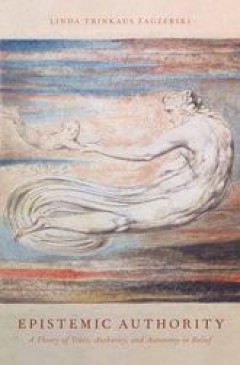Ditapis dengan

Exemplarist Moral Theory
In this book Linda Zagzebski presents an original moral theory based on direct reference to exemplars of goodness, modeled on the Putnam-Kripke theory which revolutionized semantics in the seventies. In Exemplarist Moral Theory, exemplars are identified through the emotion of admiration, which Zagzebski argues is both a motivating emotion and an emotion whose cognitive content permits the mappi…
- Edisi
- First Print
- ISBN/ISSN
- 978-0-19-065584-6
- Deskripsi Fisik
- xiii + 274 pg.; 24,5 cm.
- Judul Seri
- -
- No. Panggil
- 171 ZAG e

Epistemic Authority: A Theory of Trust, Authority, and Autonomy in Belief
This book gives an extended argument for epistemic authority from the implications of reflective self-consciousness. Epistemic authority is compatible with autonomy, but epistemic self-reliance is incoherent. The book argues that epistemic and emotional self-trust are rational and inescapable, that consistent self-trust commits us to trust in others, and that among those we are committed to tru…
- Edisi
- First Print
- ISBN/ISSN
- 978-0-19-027826-7
- Deskripsi Fisik
- xiii + 279.; 23,5 cm.
- Judul Seri
- -
- No. Panggil
- 121.6 ZAG e
 Karya Umum
Karya Umum  Filsafat
Filsafat  Agama
Agama  Ilmu-ilmu Sosial
Ilmu-ilmu Sosial  Bahasa
Bahasa  Ilmu-ilmu Murni
Ilmu-ilmu Murni  Ilmu-ilmu Terapan
Ilmu-ilmu Terapan  Kesenian, Hiburan, dan Olahraga
Kesenian, Hiburan, dan Olahraga  Kesusastraan
Kesusastraan  Geografi dan Sejarah
Geografi dan Sejarah